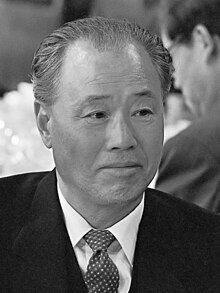Zhao Ziyang
Appearance

Zhao Ziyang (pinyin: Zhào Zǐyáng; 17 October 1919 – 17 January 2005) was a high-ranking statesman in China. He was the third Premier of the People's Republic of China from 1980 to 1987, Vice Chairman of the Communist Party of China from 1981 to 1982, and General Secretary of the Communist Party of China from 1987 to 1989. He lost power in connection with the reformative neoauthoritarianism current and his support of the 1989 Tiananmen Square protests.
Quotes
[edit]- Students, we came too late. We are sorry. You talk about us, criticize us, it is all necessary. The reason that I came here is not to ask for your forgiveness. What I want to say is that you are all getting weak, it has been seven days since you went on a hunger strike, you can't continue like this. As time goes on, your body will be damaged beyond repair, it could be very life-threatening. Now the most important thing is to end this strike. I know, your hunger strike is to hope that the Party and the government will give you a satisfying answer. I feel that our communication is open. Some of these problems can only be solved through certain procedures. For example, you have mentioned about the nature of the incident, the question of responsibility; I feel that those problems can be resolved eventually, we can reach a mutual agreement in the end. However, you should also know that the situation is very complicated, it is going to be a long process. You can't continue the hunger strike longer than seven days, and still insist on receiving a satisfying answer before ending the hunger strike.
- You are still young, we are old, you must live healthy, and see the day when China accomplishes the Four Modernizations. You are not like us. We are already old, we do not matter anymore. It is not easy for this nation and your parents to support your college studies. Now you are all about 20, and about to sacrifice your lives so easily, students, couldn't you think rationally? Now the situation is very serious, you all know, the Party and the nation is very antsy, our society is very worried. Besides, Beijing is the capital, the situation is getting worse and worse everywhere, this cannot continue. Students, you all have good will, and are for the good of our nation, but if this situation continues, loses control, it will have serious consequences elsewhere.
- In conclusion, I have only one wish. If you stop this hunger strike, the government won't close the door for dialogue, never! The questions that you have raised, we can continue to discuss. Although it is a little slow, but we are reaching some agreement on some problems. Today I just want to see the students, and express our feelings. I hope students could think about this issues calmly. This thing can not be sorted out clearly under illogical situations. You all have that strength, you are young after all. We were also young before, we protested, laid our bodies on the rail tracks, we never thought about what will happen in the future at that time. Finally, I beg the students once again, think about the future calmly. There are many things that can be solved. I hope that you will all end the hunger strike soon, thank you.
- — Shortly before 5 am on 19 May, Zhao appeared in Tiananmen Square and wandered among the crowd of protesters. Using a bullhorn, he delivered a now-famous speech to the students gathered at the square. It was first broadcast through China Central Television nationwide. Here is a translated version. Chua, Dan-Chyi (February 2009). "Zhao Ziyang's Tiananmen Square speech". Asia! Magazine. Retrieved on 23 June 2009.; also available in the original Chinese at Error on call to template:cite web: Parameters archiveurl and archivedate must be both specified or both omittedArchived copy. Archived from the original on 23 May 2009. Retrieved on 23 June 2009. (broken link)
Quotes about
[edit]- Developments in Afghanistan, Angola and Central America in 1988–9 were each regionally highly significant. In combination, these developments contributed greatly to a reduction in international tension. At the same time, they had far less of an impact on global attention than developments in the heartlands of the Communist bloc. These developments revealed two different tendencies. The brutal suppression in 1989 of pressure in China for political liberalisation, notably with the massacre of student protesters in Tiananmen Square in Beijing in April (but not only there), was central to the maintenance of a Communist bloc in East Asia. The decision to act followed tension within the leadership, with Zhao Ziyang, the General Secretary of the Party, being sympathetic to the protesters, whereas the Premier, Li Peng, wanted to use force against them. Ultimately, Deng Xiaoping backed Li. The People’s Daily referred to the pro-democracy movement as an ‘anti-Party and anti-Socialist upheaval’. It was seen as a challenge to the position and legitimacy of the Party leadership.
- Jeremy Black, The Cold War: A Military History (2015)
External links
[edit]
| General Secretaries and Chairmen of the Communist Party of China | |
|---|---|
| Party Chairmen | Mao Zedong · Hua Guofeng · Hu Yaobang |
| General Secretaries | Chen Duxiu · Xiang Zhongfa · Bo Gu · Zhang Wentian · Hu Yaobang · Zhao Ziyang · Jiang Zemin · Hu Jintao · Xi Jinping |

